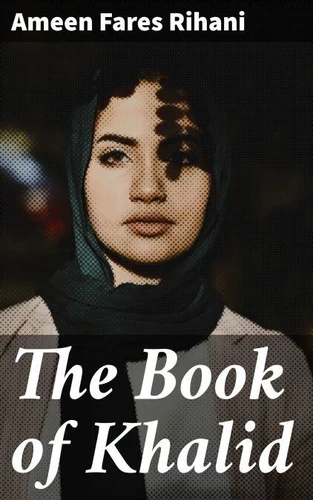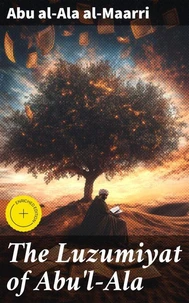The Book of Khalid. An Immigrant's Journey of Cultural Exploration and Self - Discovery in Progressive Era America
Par :Formats :
Disponible dans votre compte client Decitre ou Furet du Nord dès validation de votre commande. Le format ePub est :
- Compatible avec une lecture sur My Vivlio (smartphone, tablette, ordinateur)
- Compatible avec une lecture sur liseuses Vivlio
- Pour les liseuses autres que Vivlio, vous devez utiliser le logiciel Adobe Digital Edition. Non compatible avec la lecture sur les liseuses Kindle, Remarkable et Sony
 , qui est-ce ?
, qui est-ce ?Notre partenaire de plateforme de lecture numérique où vous retrouverez l'ensemble de vos ebooks gratuitement
Pour en savoir plus sur nos ebooks, consultez notre aide en ligne ici
- Nombre de pages409
- FormatePub
- ISBN4057664638915
- EAN4057664638915
- Date de parution25/04/2021
- Protection num.Digital Watermarking
- Taille725 Ko
- Infos supplémentairesepub
- ÉditeurGOOD PRESS
Résumé
In "The Book of Khalid, " Ameen Fares Rihani weaves a rich tapestry of Eastern and Western philosophies through the journey of its titular character, Khalid, a young Lebanese poet navigating the complexities of identity and exile. Written in a lyrical prose that reflects Rihani's dual heritage, the narrative aligns with the tradition of early 20th-century modernism while incorporating elements of romanticism and existential reflection.
The novel grapples with themes of belonging, vision, and the quest for meaning, illustrating the tension between personal aspirations and societal constraints, all set against the backdrop of a rapidly changing world. Ameen Fares Rihani, often called the father of modern Arab nationalism, was profoundly influenced by his dual upbringing in America and Lebanon. His experiences with immigration and cultural dislocation deeply informed his narratives.
Rihani's scholarly pursuits in philosophy and literature, combined with his role as a cultural mediator between East and West, provided the impetus for "The Book of Khalid, " making it a seminal work that bridges cultural divides and enriches literary dialogue. This book is highly recommended for readers interested in the exploration of identity and cultural hybridity, as well as those who appreciate artfully crafted prose that challenges conventional narrative forms.
Rihani's work is not just a novel but a compelling statement on the immigrant experience and the search for selfhood, making it a timeless read for contemporary audiences.
The novel grapples with themes of belonging, vision, and the quest for meaning, illustrating the tension between personal aspirations and societal constraints, all set against the backdrop of a rapidly changing world. Ameen Fares Rihani, often called the father of modern Arab nationalism, was profoundly influenced by his dual upbringing in America and Lebanon. His experiences with immigration and cultural dislocation deeply informed his narratives.
Rihani's scholarly pursuits in philosophy and literature, combined with his role as a cultural mediator between East and West, provided the impetus for "The Book of Khalid, " making it a seminal work that bridges cultural divides and enriches literary dialogue. This book is highly recommended for readers interested in the exploration of identity and cultural hybridity, as well as those who appreciate artfully crafted prose that challenges conventional narrative forms.
Rihani's work is not just a novel but a compelling statement on the immigrant experience and the search for selfhood, making it a timeless read for contemporary audiences.
In "The Book of Khalid, " Ameen Fares Rihani weaves a rich tapestry of Eastern and Western philosophies through the journey of its titular character, Khalid, a young Lebanese poet navigating the complexities of identity and exile. Written in a lyrical prose that reflects Rihani's dual heritage, the narrative aligns with the tradition of early 20th-century modernism while incorporating elements of romanticism and existential reflection.
The novel grapples with themes of belonging, vision, and the quest for meaning, illustrating the tension between personal aspirations and societal constraints, all set against the backdrop of a rapidly changing world. Ameen Fares Rihani, often called the father of modern Arab nationalism, was profoundly influenced by his dual upbringing in America and Lebanon. His experiences with immigration and cultural dislocation deeply informed his narratives.
Rihani's scholarly pursuits in philosophy and literature, combined with his role as a cultural mediator between East and West, provided the impetus for "The Book of Khalid, " making it a seminal work that bridges cultural divides and enriches literary dialogue. This book is highly recommended for readers interested in the exploration of identity and cultural hybridity, as well as those who appreciate artfully crafted prose that challenges conventional narrative forms.
Rihani's work is not just a novel but a compelling statement on the immigrant experience and the search for selfhood, making it a timeless read for contemporary audiences.
The novel grapples with themes of belonging, vision, and the quest for meaning, illustrating the tension between personal aspirations and societal constraints, all set against the backdrop of a rapidly changing world. Ameen Fares Rihani, often called the father of modern Arab nationalism, was profoundly influenced by his dual upbringing in America and Lebanon. His experiences with immigration and cultural dislocation deeply informed his narratives.
Rihani's scholarly pursuits in philosophy and literature, combined with his role as a cultural mediator between East and West, provided the impetus for "The Book of Khalid, " making it a seminal work that bridges cultural divides and enriches literary dialogue. This book is highly recommended for readers interested in the exploration of identity and cultural hybridity, as well as those who appreciate artfully crafted prose that challenges conventional narrative forms.
Rihani's work is not just a novel but a compelling statement on the immigrant experience and the search for selfhood, making it a timeless read for contemporary audiences.





